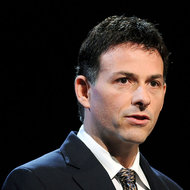 Jonathan Fickies/Bloomberg NewsDavid Einhorn, the head of the hedge fund Greenlight Capital.
Jonathan Fickies/Bloomberg NewsDavid Einhorn, the head of the hedge fund Greenlight Capital.
LONDON – David Einhorn and his hedge fund, Greenlight Capital, were fined $11 million by Britain’s financial regulator on Wednesday after he was accused of using inside information when trading the shares of a British pub chain.
The Financial Services Authority said it fined Mr. Einhorn, who became famous after making vocal bets against Lehman Brothers before that firm’s collapse, and his fund about 3.6 million pounds each for selling stock in Punch Taverns shortly after learning that the company was close to a large equity fund-raising.
“On 9 June 2009, Einhorn was a party to a telephone conference in which it was disclosed to him by a corporate broker acting on behalf of Punch Taverns Plc that Punch was at an advanced stage of the process towards a significant equity fundraising,” the regulator said in a statement. “This was inside information and Einhorn should have appreciated this.”
About two minutes after the conference call, which lasted about 45 minutes and included the broker, Mr. Einhorn and Punch management, Mr. Einhorn gave instructions to sell all of Greenlight’s holding in Punch, a 13.3 percent stake, the regulator said. Over the next four days, Greenlight managed to reduce its holding in Punch to 8.89 percent.
When Punch Taverns, one of the largest pub and bar operators in Britain, announced on June 15, 2009, that it was raising 375 million pounds on the market, the company’s share price fell 29.9 percent. The regulator claims that acting on the information before the fund-raising became public helped Greenlight avoid 5.8 million pounds in losses, or about $9 million at current exchange rates.
In a statement, Mr. Einhorn said: “We believe that this action is unjust and inconsistent with the law and with prior F.S.A. enforcement precedent. However, rather than continue an arduous fight, we have decided to put this matter behind us and concentrate on managing our business.”
Noting that Greenlight did not enter into a confidentiality agreement, Mr. Einhorn added that “we didn’t believe in 2009, and we don’t believe now, that there was anything wrong with our conduct and our action.”
The regulator said it accepted that “Einhorn’s trading was not deliberate because he did not believe that it was inside information. However, this was not a reasonable belief.”
“We expect someone in his position to be able to identify inside information when he receives it and to act appropriately,” Tracey McDermott, director of enforcement and financial crime, said. “His failure to do so is a serious breach of the expected standards of market conduct.”
The regulator contends that the conference call had provided Mr. Einhorn with three pieces of information. The broker hinted that the amount of the equity issuance would be about 350 million pounds, that the sale would happen within a week and that the fund-raising was highly likely to go ahead, the agency said.
In an e-mail to Greenlight investors, Mr. Einhorn said the fine and related legal expenses would be paid by the management company and himself without any expense to investors. He also offered investors the opportunity to redeem their investments and said he would open the Greenlight funds to replace any redemptions if needed and possibly to raise additional capital.
While Mr. Einhorn is best known for his bearish bets on stocks — most recently, shorting shares of Green Mountain Coffee Roasters — his fund also takes long positions in stocks, including General Motors and, briefly, Yahoo.
Last summer, Mr. Einhorn was in talks to buy a significant minority share of the New York Mets. That deal, however, broke down.
Article source: http://feeds.nytimes.com/click.phdo?i=7ee874fc7188014c3fde841c2c79a276